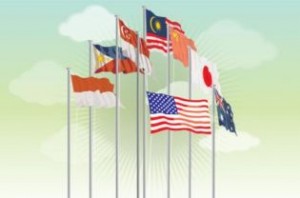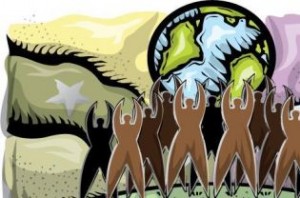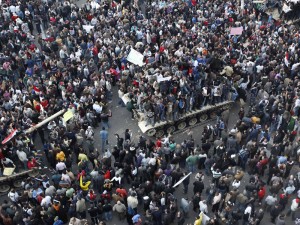-
posted by Anindya Dec 20th, 2011

At the beginning of the 21st century, the Indo-Pacific region, consisting of the Asia Pacific and South Asia, existed in an interregnum. The Cold War and the period that followed had passed into history, and it was time for a new era to begin.
What began, instead, was the Age of Terror, inaugurated by the 9/11 attacks in the United States. However, unless terrorism wins, it cannot define an era, no matter how terrible its tactics and how atrocious its results. This is because neither terrorism nor the war against it can settle the great issues of the day.
Thus, the war on terror could not and did not define the relationship between the great powers of the region, primarily the United States, China, Japan and India. It did not, because it could not, decide the balance of power among these nations on the basis of their economic, political, military and cultural strengths. Terrorism merely postponed the inevitable rebalancing of power in the Indo-Pacific region. The region lived in an interregnum for the first decade following 9/11. Continue Reading »
Posted in English | No Comments »
-
posted by Anindya Apr 14th, 2011
 In the 1960s, Canadian media theorist Marshall McLuhan wrote with prophetic insight that the world was “no more than a village.”
In the 1960s, Canadian media theorist Marshall McLuhan wrote with prophetic insight that the world was “no more than a village.”“Electric speed at bringing all social and political functions together in a sudden implosion has heightened human awareness of responsibility to an intense degree,” he argued.
Five decades later, the prophetic has become ordinary. The term “global village” has passed into the lexicon of internationalist thinking so well that, today, it would be dramatic to suggest that we don’t live in such an interconnected world.
As a global villager, I find the term indispensable because it reflects four key aspects of the modern world. Continue Reading »
Posted in English | No Comments »
-
posted by Anindya Mar 8th, 2011

foto:AP Photo
As the rest of the world watches with amazement, and some trepidation, at the unsuspected revolution unfolding in the Middle East, Indonesians can be forgiven for treating events there with a measure of déjà vu. Relax, they say: We have been there, done that. Indeed, it is the Middle East in turmoil which perhaps should look at Indonesia as a model for how to democratise with Muslim characteristics.
What unites the Iranian revolution of 1979, the revolutions in Eastern Europe in 1989, the overthrow of the Suharto regime roughly a decade later, and the jasmine revolution today is their objective: the ditching of autocracies that have passed their sell-by date. These revolutions represent a massive clearing of historical shelves.
It does not matter what kind of product has gone stale: pompous monarchies; vanished socialisms; murderous juntas; civilian despotisms; or the creeping dotage of corrupt, inefficient and unaccountable regimes. It does not matter whether the revolution is sparked by the silent presence of a Berlin Wall, the resounding collapse of a national economy, or the screaming self-immolation of a street-hawker who becomes the contorted face of a whole country, a whole region and a whole indicted era. Continue Reading »
Posted in English | No Comments »
-
posted by Anindya Feb 9th, 2011

foto: thejakartapost.com
There has been extensive media coverage in recent days about violent incidents having a background in religious differences. In Pandeglang, Banten, on Sunday, 6 February 2011, residents of different faiths had a conflict. Similar events took place two days later, on Tuesday 8 February 2011, in Temanggung.
These events claimed lives and resulted in the destruction of religious facilities and personal property. These harrowing events are seemingly interconnected. Just as they occurred in one place, they were followed by a similar incident at another location.
Through this blog, as a citizen I want to voice my concern. I am concerned because our main foundation as a people, namely Bhinneka Tunggal Ika or Unity in Diversity, has begun to shake. This national motto, which has always resulted in tolerance and the unity of all of the different elements of society, has now begun to falter. Continue Reading »
Posted in English | No Comments »
-
posted by Anindya Apr 7th, 2010
 Anindya Bakrie is deputy chairman of the Indonesian Chamber of Commerce and Industry (Kadin).
Anindya Bakrie is deputy chairman of the Indonesian Chamber of Commerce and Industry (Kadin).
When Chinese Premier Wen Jiabao makes his first trip to Indonesia this April, he will beat US President Barack Obama (who has postponed his March trip to June) to the Association of Southeast Asian Nations’ (ASEAN) largest country. Premier Wen’s trip is important, not only in contrast to President Obama’s non-trip but also in underlining China’s deep historical links with the region.
Indonesia — and the rest of ASEAN — is watching China in a global context where the financial crisis has revealed the limits of America’s power. By contrast, China is rising and sharing its prosperity with friends.
Ever since China’s opening to the world in the late 1970s — but particularly since the end of the Cold War when it rejoined the global economy — China changed not only itself but also the rest of the world. China’s rising profile has to do with historical as well as economic factors. That history is being remade today. When Premier Wen comes to Indonesia, he will bring with him tidings of history being remade. Continue Reading »
Posted in English | 7 Comments »
INSTAGRAM
TWITTER
FACEBOOK
-









